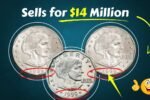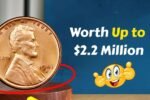Imagine discovering a coin in your pocket change that could make you a millionaire instantly. Sounds like a dream, right? For a lucky few, that dream became reality with the discovery of the rare 1943 Lincoln penny. While most pennies are worth just one cent, certain Lincoln pennies, especially rare minting errors, are now fetching eye-popping prices at auctions. One 1943 bronze Lincoln penny even sold for a staggering $2.1 million.
Why the 1943 Lincoln Penny is Special
The Lincoln penny, first minted in 1909, is instantly recognizable thanks to Abraham Lincoln’s portrait on the front and wheat stalks on the back a design by Victor David Brenner. Most pennies from this era are common and carry minimal value. However, the 1943 penny has a unique story: during World War II, copper was reserved for the war effort, so pennies were made from zinc-coated steel instead. Somehow, a handful of pennies were accidentally struck in bronze. These rare “mistake coins” are among the most valuable in U.S. coin history.
What Makes Certain Pennies Worth Millions?
Several factors determine why some Lincoln pennies are worth far more than their face value:
- Minting Errors: Coins struck incorrectly, like the 1943 bronze penny, are exceptionally rare.
- Low Production Numbers: Some years or mint locations produced fewer coins, boosting scarcity.
- Condition: Pristine, well-preserved coins command higher prices.
- Historical Significance: Coins tied to major events, like wartime production, attract collectors.
Other Notable Lincoln Penny Varieties
Collectors also keep an eye out for these high-value pennies:
| Year | Mint Mark | Feature/Error | Estimated Value |
|---|---|---|---|
| 1943 | Philadelphia | Bronze (not steel) | $2.1 million |
| 1909 | S (San Francisco) | VDB initials | $100,000–$500,000 |
| 1955 | Philadelphia | Doubled Die Obverse | $50,000–$150,000 |
| 1969 | S (San Francisco) | Doubled Die Obverse | $25,000–$100,000 |
| 1914 | D (Denver) | Low mintage | $75,000–$200,000 |
Each of these pennies carries its own story, making them highly coveted by collectors worldwide.
How to Identify a Rare Lincoln Penny
Finding a valuable Lincoln penny requires careful inspection:
- Check the Date and Mint Mark – Look for key years like 1943, 1909, or 1955. Mint marks “S” (San Francisco) or “D” (Denver) indicate rarity. No mint mark usually means Philadelphia.
- Inspect for Errors – Examine the coin for unusual features, like doubled lettering or, in the case of 1943 pennies, whether it is magnetic (steel pennies stick to magnets, bronze does not).
- Evaluate Condition – Coins with minimal wear, scratches, or tarnish are more valuable. Professional grading services can confirm authenticity and condition.
Where to Look
Rare pennies can be hiding anywhere:
- Loose change at home or in coin jars
- Bank rolls of pennies
- Estate sales or flea markets
- Inherited collections or old piggy banks
Tips for Selling a Valuable Penny
If you think you’ve found a million-dollar coin:
- Get it authenticated by a reputable dealer
- Avoid cleaning it, as this can reduce value
- Research auction houses to maximize sale price
- Store it safely in a protective holder
Why Collectors Love Lincoln Pennies
Lincoln pennies aren’t just currency they’re a slice of American history. From the early 1900s to the mid-20th century, they were part of everyday life. Their iconic design, historical significance, and the potential for rare errors make them irresistible to collectors.
Start Your Hunt
Whether it’s the 1943 bronze error or the 1909-S VDB penny, these coins are still in circulation. Every handful of change could hide a potential treasure. So grab a magnifying glass, inspect your pennies, and who knows you might just find a coin worth $2.1 million!




